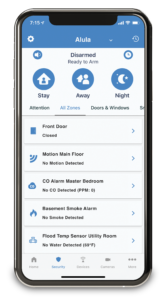Call for a FREE, NO OBLIGATION quote. We will come to your home or business, explain what is available, make recommendations, and provide a quote. We will NOT try to pressure you to sign up right away – we want you to have time to think about it and make sure you are comfortable
 Protecting homes and businesses in Kitchener, Waterloo, Cambridge, Guelph, and surrounding areas for over 40 years.
Protecting homes and businesses in Kitchener, Waterloo, Cambridge, Guelph, and surrounding areas for over 40 years.
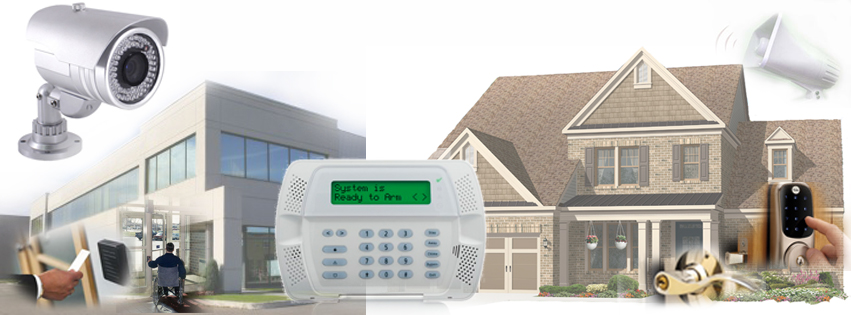 Custom designed wired, wireless, and hybrid burglar alarm systems to meet your specific needs.
Custom designed wired, wireless, and hybrid burglar alarm systems to meet your specific needs.
Meet Alula… state of the art wireless feature packed security system
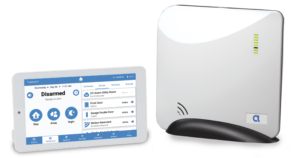 Sleek control panel sits on a floor, desk, or shelf and plugs into your computer network
Sleek control panel sits on a floor, desk, or shelf and plugs into your computer network
Touchscreen keypad mounts on the wall, or sits on a desk or counter
Communicates to the monitoring station via the internet with backup via cellular towers
On your smart phone app you can:
Check the status of the system including open doors or windows
Arm and Disarm your system
Get notifications when system is armed, disarmed, or when there is an alarm
View the history of activity on the system
Wide variety of sensors to detect a burglar, fire, carbon monoxide, water on the floor, cold temperature, etc.
How Do Burglar Alarm Systems Work?
Alarm systems incorporate a variety of devices linked together either by wires or wirelessly. The system is turned on (armed) and off (disarmed) by means of a keypad or remotely by means of a keyfob or smart phone.
Home Alarm Systems Cambridge
When an intruder enters and trips the system while it is armed, a siren sounds on the premises and a signal is transmitted to the monitoring station who will notify those you have indicated you want called. The various components are explained below:
Control Panel
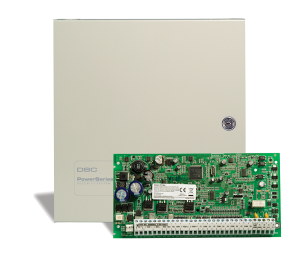 The heart of the alarm system and determines all the features of the system. Each control panel can handle a certain number of zones (each door contact, motion detector, etc. are put on a separate zone). You can get systems from 6 right up to 128 zones. Any future expansions should be considered when choosing the control panel. It consists of a main circuit board inside a metal cabinet and is usually located in the basement or somewhere out of the way. You seldom need to access it. All devices in the system connect to this control.
The heart of the alarm system and determines all the features of the system. Each control panel can handle a certain number of zones (each door contact, motion detector, etc. are put on a separate zone). You can get systems from 6 right up to 128 zones. Any future expansions should be considered when choosing the control panel. It consists of a main circuit board inside a metal cabinet and is usually located in the basement or somewhere out of the way. You seldom need to access it. All devices in the system connect to this control.
Keypads & Keyfobs
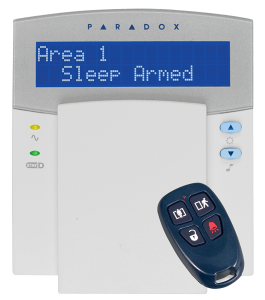 Keypads are what you use to arm and disarm the system. They also tell you the status of the system and each detector . You can get keypads with an LCD readout as shown in this picture and usually cost a little more, or they can have lights to show the status of the different devices, or zones. Keyfobs go on your keychain and are used to arm and disarm the system from inside or outside the building. Your system must have wireless capability for them to work. You can also have the option of controlling your system from a smart phone.
Keypads are what you use to arm and disarm the system. They also tell you the status of the system and each detector . You can get keypads with an LCD readout as shown in this picture and usually cost a little more, or they can have lights to show the status of the different devices, or zones. Keyfobs go on your keychain and are used to arm and disarm the system from inside or outside the building. Your system must have wireless capability for them to work. You can also have the option of controlling your system from a smart phone.

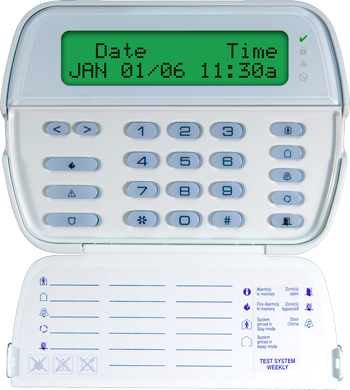
Door & Window Contact
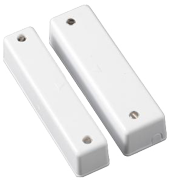 Door/Window Contact is a magnetic switch which is placed on doors or windows. When the switch and magnet are close together, the alarm system considers the door or window closed. They separate when the door or window is open. When the system is armed, opening the door or window will trip the alarm. If a door which is designated as an entry/exit door is tripped (such as when you enter the building), the keypad will sound to remind you to turn off the system before the entry delay expires. Failure to disarm the system within the designated entry time will result in an alarm.
Door/Window Contact is a magnetic switch which is placed on doors or windows. When the switch and magnet are close together, the alarm system considers the door or window closed. They separate when the door or window is open. When the system is armed, opening the door or window will trip the alarm. If a door which is designated as an entry/exit door is tripped (such as when you enter the building), the keypad will sound to remind you to turn off the system before the entry delay expires. Failure to disarm the system within the designated entry time will result in an alarm.
Motion Detectors
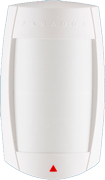 Motion detectors scan the room and see an intruder by detecting body heat. When a warm body moves into the path of a detector, there is a sharp and sudden contrast between the background and the body. Higher quality detectors have built-in processors which can distinguish between a small animal and a person by the amount of infrared energy (body heat) that is emitted.
Motion detectors scan the room and see an intruder by detecting body heat. When a warm body moves into the path of a detector, there is a sharp and sudden contrast between the background and the body. Higher quality detectors have built-in processors which can distinguish between a small animal and a person by the amount of infrared energy (body heat) that is emitted.
Glassbreak Detectors
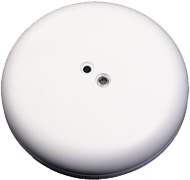 Glassbreak detectors have a built-in microphone which “hears” the sound of breaking glass. When a window is broken, the detector picks up the sounds, analyses them, and trips the alarm if the sound is consistent with breaking glass. They typically have a direct-line-of-sight range of 20-25 feet depending on the acoustics of the room. This method of detecting a burglar is often used when there are pets in the home which will trip motion detectors. They allow you to have perimeter protection of the building with the freedom to walk around inside without setting off the alarm. They can provide an earlier detection of a break-in because they trip the alarm BEFORE the burglar enters the premises; thus they are often referred to as “pre-entry” alarms.
Glassbreak detectors have a built-in microphone which “hears” the sound of breaking glass. When a window is broken, the detector picks up the sounds, analyses them, and trips the alarm if the sound is consistent with breaking glass. They typically have a direct-line-of-sight range of 20-25 feet depending on the acoustics of the room. This method of detecting a burglar is often used when there are pets in the home which will trip motion detectors. They allow you to have perimeter protection of the building with the freedom to walk around inside without setting off the alarm. They can provide an earlier detection of a break-in because they trip the alarm BEFORE the burglar enters the premises; thus they are often referred to as “pre-entry” alarms.Other Devices
Alarm systems can also be made to detect the presence of smoke, water on the floor, toxic gases, etc. Smoke Alarms can be added to your security system to detect the presence of smoke and automatically notify the monitoring station – even when no one is in the premises to make a call.
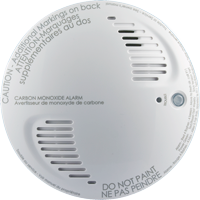
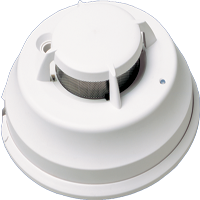

Sirens
When an alarm is tripped, the siren makes a loud sound to hopefully scare the intruder off.
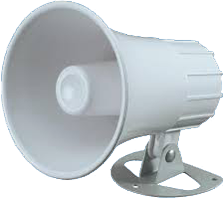
Wireless Alarm Communicator
 Wireless Alarm Communicator (cellular back-up radio) is a device which can be added to your system as a back-up method of getting alarm signals to the monitoring station. Usually alarm signals are sent to the monitoring station via a phone line. However, because phone lines are not always reliable, you can also choose to add a cellular back-up radio which will send signals to the monitoring station if your phone line is cut or otherwise not working. This is highly recommended for a more secure system. These units can also be your primary method of communicating to the monitoring station if you have no phone line on the premises.
Wireless Alarm Communicator (cellular back-up radio) is a device which can be added to your system as a back-up method of getting alarm signals to the monitoring station. Usually alarm signals are sent to the monitoring station via a phone line. However, because phone lines are not always reliable, you can also choose to add a cellular back-up radio which will send signals to the monitoring station if your phone line is cut or otherwise not working. This is highly recommended for a more secure system. These units can also be your primary method of communicating to the monitoring station if you have no phone line on the premises.
Monitoring Service
 Hopefully the siren will scare the burglar away, but it doesn’t always work; and usually burglars don’t even have the courtesy to fix the window or close the door after them when they do run out, leaving your premises vulnerable to others. It is important to have someone you know and trust notified in case of a break-in so they can investigate, call the police if they see anything suspicious, and arrange for repairs to be made. When an alarm trips, a signal is immediately sent to the monitoring station indicating that the alarm has been violated – and it even tells what area(s) have been entered. The monitoring station will then notify you, neighbours, relatives etc. in whatever order you have indicated. There is a monthly charge for monitoring services. It is an important part of your protection.
Hopefully the siren will scare the burglar away, but it doesn’t always work; and usually burglars don’t even have the courtesy to fix the window or close the door after them when they do run out, leaving your premises vulnerable to others. It is important to have someone you know and trust notified in case of a break-in so they can investigate, call the police if they see anything suspicious, and arrange for repairs to be made. When an alarm trips, a signal is immediately sent to the monitoring station indicating that the alarm has been violated – and it even tells what area(s) have been entered. The monitoring station will then notify you, neighbours, relatives etc. in whatever order you have indicated. There is a monthly charge for monitoring services. It is an important part of your protection.
Is a “Free” Burglar Alarm System Really Free? or Is It a Marketing Trap?
If it sounds too good to be true, it probably is! (quoted by a BBB representative)
We are not aware of any charity burglar alarm companies. Every business needs to make a profit in order to survive. Unfortunately, some want a bigger share of the profits and so they devise clever marketing schemes to lure in unsuspecting and often vulnerable people. Once in the door, the cleverly trained salesman works you over like putty to get you to buy whatever he wants you to… and many are good at it. Here are some of the things that often happen, or they forget to tell you about:
- The “free” system only includes a small amount of equipment. Of course you’ll need more to do a proper job, but the additional equipment is not free – in fact, it is often over priced to make up the difference of the “free”
portion. - The “free” system is a low-end, basic system and you should upgrade to a better system… for a “special” low price (only if you sign up now).
- There is a monthly fee for monitoring… with a multi-year locked-in contract that automatically renews. Oh, and that monthly fee has increases each year. All this is in the fine print of the contract which is barely large enough to read with a magnifying glass.
- You don’t own the equipment – the alarm company does. If, at the renewal point of the contract, you decide to cancel because the monthly rate has climbed too high, the company will come and take out their system,
leaving you the holes in the walls. - The installing company sells your account to the large national company whose familiar name they used during the sales pitch. When a problem arises, the blame game ensues.
- If they didn’t get your money up front, they’ll get it later from the above average number of service calls you’ll need to repair your “basic” system… at above average service rates.
Our Service Area
We are located in Kitchener, serving the Greater Kitchener Waterloo area, Cambridge, Guelph and all nearby towns for all their burglar alarm needs.

